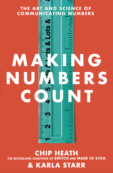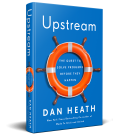In honor of the recent paperback release of The Blue Sweater, as well as the release of Switch, Jacqueline Novogratz and I decided that we’d swap short Q&As. Three questions each.
Novogratz is the CEO of the Acumen Fund, and I’m a big fan of the work that Acumen does. (Learn more about it below.) Her book, The Blue Sweater, reflects on her work using investment as a tool to fight poverty. It is a fine book — part memoir and part rallying cry — and full of the kinds of stories that help you see why it’s so hard (and yet so essential) to get development work right. And now for the interview:
Heath: Most of us are familiar with two tools for combating poverty: aid programs and microcredit. But you’re adding a third. You founded the Acumen Fund to make investments in organizations that could improve the lives of the poor. (A “venture capital fund for the poor,” as you write.) Why have you committed yourself to building organizations instead of assisting the poor directly?
Novogratz: When 3 billion people on the planet are living in poverty, you have a systems problem. We don’t need more small programs serving a few thousand people, but new constructs and approaches to solving big problems of poverty altogether. Markets alone have not solved problems of poverty; and tradition top-down aid or charity alone too often create a sense of dependence rather than dignity. We need a middle way, one that lies between the markets and traditional charity. I believe the world is ready for new models that recognize that unbridled capitalism will not create a world in which all people can pursue their dreams. Patient capital is one such way. By investing long-term in organizations that see the poor not as passive recipients of charity but as agents who want to change their own lives, I’ve seen patient capital bring affordable, quality services to millions in the developing world. That’s where dignity starts.
Heath: If you wanted to make a believer out of someone — to show them firsthand the power of Acumen’s approach to fighting poverty — where would you take them? Whose work would you want them to see?
Novogratz: There are many places I’d take them now, which is the good news! I might start with taking them to harsh, drought-ridden fields where some of the poorest farmers in the world scratch out hardscrabble lives growing and selling crops like tomatoes and okra, often earning less than a dollar a day. For decades, development agencies have tried to help the 200 million smallholder farmers in India alone, providing them with seeds and other inputs that for various reasons did little to improve their productivity. On the other hand, Israel has been using drip irrigation to transform desert lands to emerald fields since 1960, and yet the price of their technology is too high for the smallholder farmer to afford.
Amitabha Sedangi, founder of IDE-India, was fascinated with the Israeli model. He asked what it would take to re-design the drip irrigation technology to be affordable – and useful – to the smallholder farmer. He determined he needed to follow three principles based on how farmers themselves make decisions (rather than starting with what he thought they needed). First, Miniaturization: if a typical smallholder farmer has one acre of land, he will risk no more than a quarter-acre to try an untested technology. Systems built for farms of a thousand acres had to be “miniaturized” down to fit a quarter acre. Second was Extreme Affordability: a farmer would need to see his investment returned to him after a single harvest to feel comfortable investing in the new technology. And third, Incremental Expandability: with the profits earned from the first quarter acre, the farmer could buy a second; and so on….
To date, IDE-India has sold more than 400,000 drip irrigation systems to some of the world’s poorest farmers. These farmers have experienced, on average, a doubling or tripling of their yields and income levels. That means more than two million people are benefiting from higher crop yields due not to charity but because low-income farmers are able to make their own decisions and invest in a way that creates real economic returns to themselves and their families. This is the power of customer-oriented innovation combined with patient capital, for it creates sustainable, scalable change – systems change that enable us to imagine a different kind of world.
Heath: I suspect your book and your TED talks will create a lot of “sympathetic spectators” — people who support your efforts but can’t write you a $100,000 check or contribute to the fieldwork. Are there little things we can do to support you?
Novogratz: Thanks for asking that question! There are so many things people can do. First, any contribution to Acumen Fund is appreciated, and for every dollar WE invest, we see an additional $4 in co-investment in our companies. I remember a seven year old girl who sent me an envelope filled with twenty $1 bills – that was one of my favorite contributions. Second, people can blog about Acumen as well as The Blue Sweater to get the word out that there is a new kind of approach, a middle way to effecting social change by investing patient capital in social entrepreneurs who are building systemic approaches to change. Third, you can join Acumen Fund’s community and find not only a group of like-minded, committed individuals from around the world, but also a host of ideas for other ways to get involved! You might also join one of our 40 communities around the world. Fifth – and importantly – you can support Acumen by integrating the ideas of patient capital and treating the poor as agents who want to make their own decisions into the work you already do.
We need a new way of solving poverty and it must begin with how we think about poor people altogether. And then we need examples of what works — and a commitment to talk about what fails as well so that we can accelerate learning around the world. Imagining, and then creating, a world without poverty starts with changing the way we think about the poor, and then building systems that enable greater freedom, greater choice, and, ultimately, the ability of each and every one of us to reach our greatest potential.



